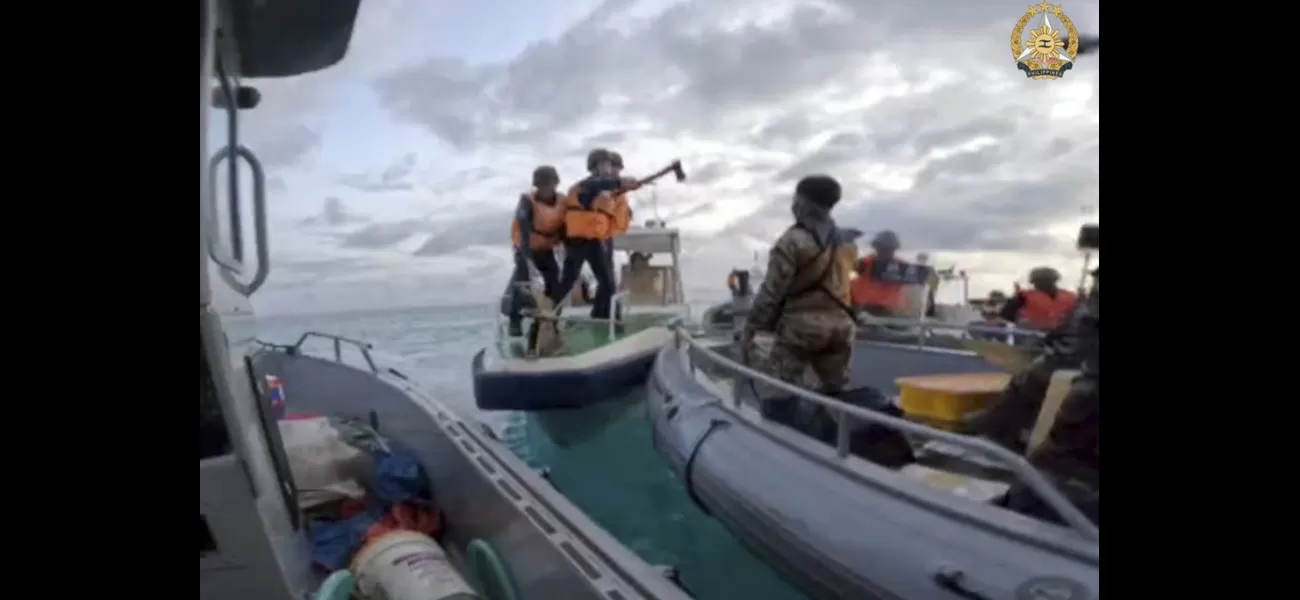China and the Philippines have created a hotline to prevent naval conflicts in the South China Sea.
New deal allows direct communication between Chinese and Filipino presidential offices.
July 17th 2024.

According to the latest news, a recent agreement has been signed between China and the Philippines to establish a direct line of communication between their presidential offices. The main goal of this agreement is to prevent any further conflicts from escalating in the South China Sea, a disputed area between the two countries. The Associated Press has had a peek at the highlights of this accord and shared the details on Tuesday.
This is not the first time that China and the Philippines have set up emergency hotlines to handle disputes in the past. However, this new communication channel is expected to be more effective in managing any potential conflicts, especially in the two contentious shoals where tensions have been rising. The Philippines has accused China of aggressive actions, while China claims that Philippine ships have been entering their territory without permission.
Despite previous efforts, the territorial disputes have continued, causing concerns about a possible armed conflict involving the United States. The US has repeatedly warned that it has a treaty obligation to defend the Philippines if they come under attack in the disputed waters. To address these concerns, US Gen. Charles Brown Jr., chairman of the Joint Chiefs of Staff, met with Philippine military chief Gen. Romeo Brawner in Manila on Tuesday to discuss ways to strengthen their defense ties.
The Philippines has also faced challenges in reaching Chinese officials during emergencies. In August 2023, during a confrontation at the Second Thomas Shoal, the Philippine government was unable to contact Chinese authorities for several hours through their established "maritime communication mechanism." This hotline was set up after a meeting between Philippine President Ferdinand Marcos Jr. and Chinese President Xi Jinping in Beijing in January 2023.
In response to this incident, Chinese and Philippine officials held talks in Manila on July 2 to address the territorial disputes. It was reported that during the confrontation, Chinese coast guard personnel used knives, an axe, and improvised spears, injuring Philippine navy personnel and seizing seven navy rifles. Gen. Brawner demanded that China return the firearms and pay for the damages.
After the talks, the Department of Foreign Affairs in Manila released a statement saying that both sides recognized the need to strengthen their maritime communication and signed an arrangement for this purpose. However, the details of the agreement were not provided. According to the highlights of the agreement, there will be various channels of communication between the two countries, specifically on maritime issues, through designated representatives.
In addition to the hotline, there are plans to establish a new communication channel between the Chinese and Philippine coast guards once a memorandum of understanding is concluded. During the talks, both sides also agreed on other confidence-building measures, such as intensifying cooperation between their respective coast guard authorities and convening a maritime forum with scientists and academic leaders from China and the Philippines.
The Department of Foreign Affairs statement also mentioned that the main goal of these efforts is to restore trust and confidence between the two countries and create a conducive environment for productive dialogue and interaction. It also emphasized that both China and the Philippines are committed to de-escalating tensions without compromising their positions. While significant progress has been made in managing the situation at sea, there are still some major differences that need to be addressed.
This is not the first time that China and the Philippines have set up emergency hotlines to handle disputes in the past. However, this new communication channel is expected to be more effective in managing any potential conflicts, especially in the two contentious shoals where tensions have been rising. The Philippines has accused China of aggressive actions, while China claims that Philippine ships have been entering their territory without permission.
Despite previous efforts, the territorial disputes have continued, causing concerns about a possible armed conflict involving the United States. The US has repeatedly warned that it has a treaty obligation to defend the Philippines if they come under attack in the disputed waters. To address these concerns, US Gen. Charles Brown Jr., chairman of the Joint Chiefs of Staff, met with Philippine military chief Gen. Romeo Brawner in Manila on Tuesday to discuss ways to strengthen their defense ties.
The Philippines has also faced challenges in reaching Chinese officials during emergencies. In August 2023, during a confrontation at the Second Thomas Shoal, the Philippine government was unable to contact Chinese authorities for several hours through their established "maritime communication mechanism." This hotline was set up after a meeting between Philippine President Ferdinand Marcos Jr. and Chinese President Xi Jinping in Beijing in January 2023.
In response to this incident, Chinese and Philippine officials held talks in Manila on July 2 to address the territorial disputes. It was reported that during the confrontation, Chinese coast guard personnel used knives, an axe, and improvised spears, injuring Philippine navy personnel and seizing seven navy rifles. Gen. Brawner demanded that China return the firearms and pay for the damages.
After the talks, the Department of Foreign Affairs in Manila released a statement saying that both sides recognized the need to strengthen their maritime communication and signed an arrangement for this purpose. However, the details of the agreement were not provided. According to the highlights of the agreement, there will be various channels of communication between the two countries, specifically on maritime issues, through designated representatives.
In addition to the hotline, there are plans to establish a new communication channel between the Chinese and Philippine coast guards once a memorandum of understanding is concluded. During the talks, both sides also agreed on other confidence-building measures, such as intensifying cooperation between their respective coast guard authorities and convening a maritime forum with scientists and academic leaders from China and the Philippines.
The Department of Foreign Affairs statement also mentioned that the main goal of these efforts is to restore trust and confidence between the two countries and create a conducive environment for productive dialogue and interaction. It also emphasized that both China and the Philippines are committed to de-escalating tensions without compromising their positions. While significant progress has been made in managing the situation at sea, there are still some major differences that need to be addressed.
[This article has been trending online recently and has been generated with AI. Your feed is customized.]
[Generative AI is experimental.]
0
0
Submit Comment





